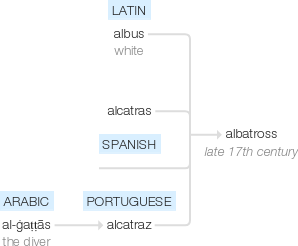Albatross
late 17th century: alteration (influenced by Latin albus ‘white’) of 16th-century alcatras, applied to various seabirds including the frigate bird and pelican, from Spanish and Portuguese alcatraz, from Arabic al-ġaṭṭās ‘the diver’.
wiktionary
Uncertain. Probably from Spanish or Portuguese alcatraz(“pelican, gannet, albatross”), probably derived from Arabic الْغَطَّاس (al-ḡaṭṭās, “the diver”) (compare Alcatraz); or from Portuguese alcatruz(“water wheel bucket”), from Arabic الْقَادُوس (al-qādūs), from Ancient Greek κάδος(kádos, “ pail, jar”), in reference to the pouch of a pelican. [1] In either case, altered under the influence of Latin albus(“white”). Not derived from modern Arabic قَطْرَس (qaṭras, “albatross”), which is perhaps borrowed from Spanish.
See albatross around one’s neck.
etymonline
albatross (n.)
1670s, probably from Spanish or Portuguese albatros, alteration of alcatraz "large, web-footed sea-bird; cormorant," originally "pelican" (16c.). This name is perhaps from Arabic al-ghattas "sea eagle" [Barnhart]; or from Portuguese alcatruz "the bucket of a water wheel" [OED], from Arabic al-qadus "machine for drawing water, jar" (which is from Greek kados "jar"). If the second, the name would be a reference to the pelican's pouch (compare Arabic saqqa "pelican," literally "water carrier").
The spelling was influenced by Latin albus "white." The name was extended by 17c. English sailors to a larger sea-bird (order Tubinares), which are not found in the North Atlantic. [In English the word also formerly was extended to the frigate-bird.] These albatrosses follow ships for days without resting and were held in superstitious awe by sailors. The figurative sense of "burden" (1936) is from Coleridge's "Rime of the Ancient Mariner" (1798) about a sailor who shoots an albatross and then is forced to wear its corpse as an indication that he alone, not the crew, offended against the bird. The prison-island of Alcatraz in San Francisco Bay is named for pelicans that roosted there. In Dutch, stormvogel; in German Sturmvogel "storm-bird."
